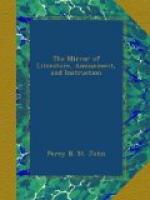Canst thou not tell a tale of varied life,
That gave Time’s annals
their recording name?
No notes of Cade, marching with mischief
rife,
By Britain’s misery
to raise his fame?
Wert thou the hone that “City’s
Lord” essay’d[5]
To make the whetstone of his rebel blade?
Wert thou—’tis pleasant
to imagine it,
Howe’er absurd such
notions may be thought—
When the wide heavens, wild with thunder
fit,
Huge hailstones to distress
the nation wrought,
A mass congeal’d of heaven’s
artill’ry wain,[6]
A “hailstone chorus” of a
Mary’s reign?
Or, wert thou part of monumental shrine
Rais’d to a genius,
who, for daily bread,
While living, the base world had left
to pine,
Only to find his value out
when dead?
Say, wert thou any such memento lone,
Of bard who wrote for bread, and got a
stone?
How many nations slumber on their deeds.
The all that’s left
them of their mighty race?
How may heroes’ bosoms, wars, and
creeds
Have sought in stilly death
a resting place,
Since thou first gave thy presence to
the air,
Thou, who art looking scarce the worse
for wear!
Oft may each wave have travell’d
to the shore,
That ends the vasty ocean’s
unknown sway,
Since thou wert first from earth’s
remotest pore,
Rais’d as an emblem
of man’s craft to lay;
Yet those same waves shall dwindle into
earth,
Ere, lost in time, we learn thy primal
worth.
They tell us “walls have ears”—then
why, forsooth,
Hast thou no tongue, like
ancient stones of Rome,
To paint the gory days of Britain’s
youth,
And what thou wert when viler
was thy home?
Man makes thy kindred record of his name—
Hast thou no tongue to historize
thy fame?
But thou! O, thou hast nothing to
repeat!
Lump of mysteriousness, the
hand of Time
No early pleasures from thy breast could
cheat,
Or witness in decay thine
early prime!
Yes, thou didst e’er in stony slumbers
lay,
Defying each M’Adam of his day.
Eternity of stone! Time’s lasting
shrine!
Whose minutes shall by thee
unheeded pour!
With whom in still companionship thou’lt
twine
The past, the present, shall
be evermore,
While innate strength shall shield thee
from his hurt,
And worlds remain stone blind to
what thou wert.
P.T.
[5] “Now is Mortimer lord of the city.”—Vide Shakspeare.
[6] In the reign of Mary,
hailstones, which measured fifteen
inches
in circumference, fell upon and destroyed two small
towns
near
Nottingham.—Cooper’s Hist. England.
* * * * *
THE NECK.[7]
A SWEDISH TRADITION.
(For the Mirror.)




